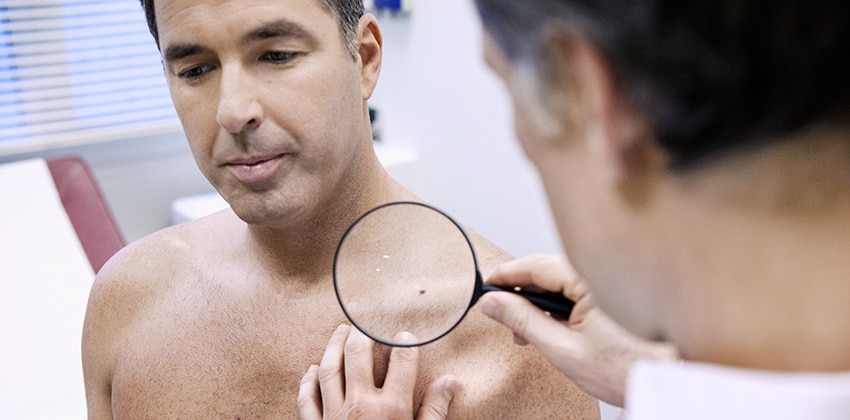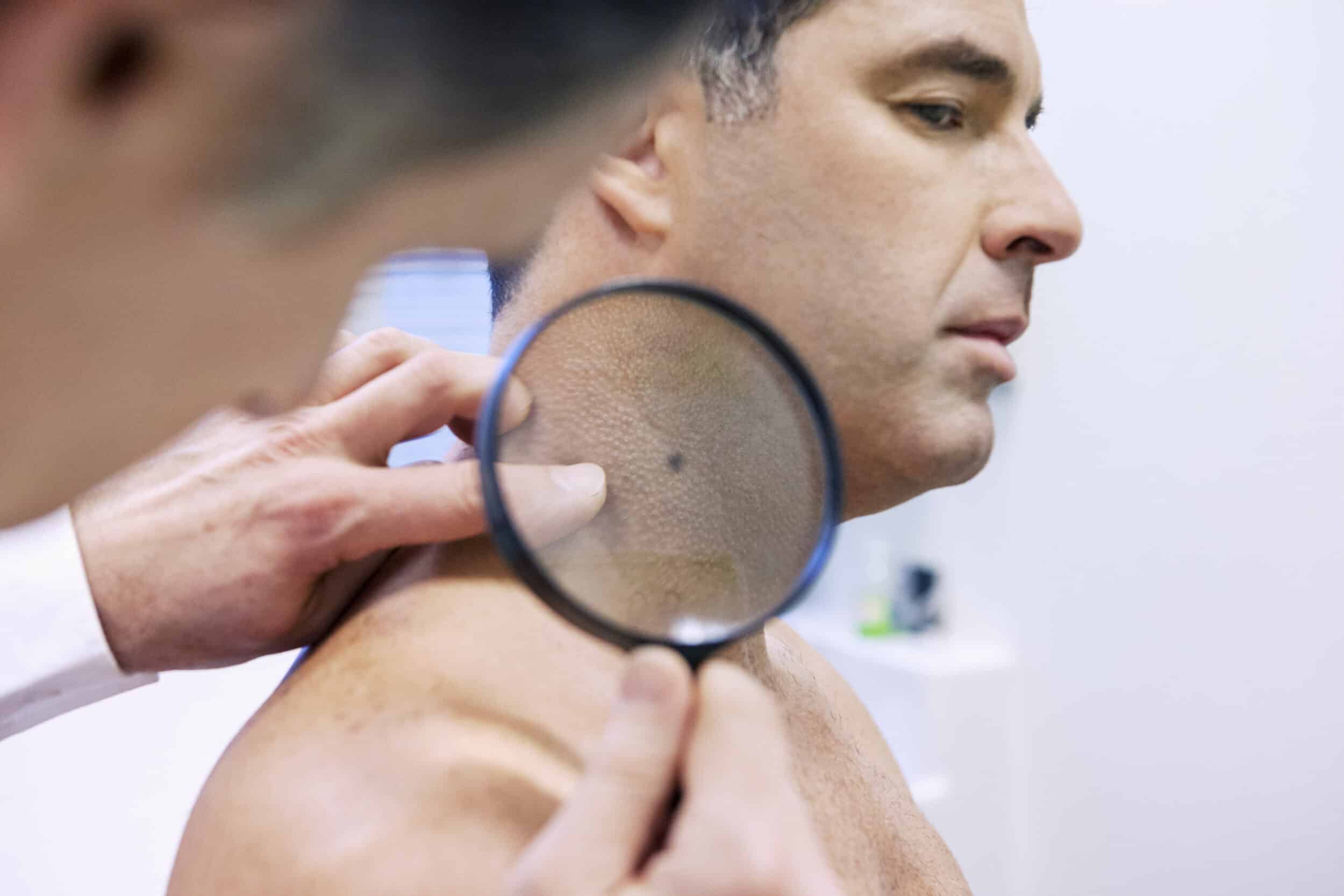Squamous Cell Carcinoma – Skin Cancer Treatment in Naples & Fort Myers, FL

Squamous cell carcinomas detected at an early stage and removed promptly are almost always curable and cause minimal damage. However, left untreated, they eventually penetrate the underlying tissues and can become dangerous.
How Is Squamous Cell Carcinoma Diagnosed?
Any suspicious growth should be seen by one of our Naples or Fort Myers dermatologists immediately. A tissue sample (biopsy) will be examined under a microscope to arrive at a diagnosis. If tumor cells are present, we will proceed to treat the cancer.
Treatment for Squamous Cell Carcinoma
Fortunately, there are several effective ways to eradicate squamous cell carcinoma. The choice of treatment is based on the type, size, location, and depth of penetration of the tumor, as well as the patients age and general health.
Treatment can usually be performed on an outpatient basis at Harris Dermatology. A local anesthetic is used during most surgical procedures.
Is Treatment Painful?
Pain or discomfort is usually minimal with most techniques, and there is rarely much pain afterwards.
What Is Squamous Cell Carcinoma?
Squamous cell carcinoma (SCC) is a form of skin cancer originating in the squamous cells. These are thin, flat cells in the outer layer of the skin (the epidermis).
SCC is one of the most common forms of skin cancer. It typically occurs in areas exposed to the sun, such as the face, ears, neck, hands, and arms. However, it can also develop on other body parts, including the mucous membranes and genitals.

How To Detect Squamous Cell Carcinoma
Detecting SCC early is crucial for effective treatment and better outcomes. Here are the key steps and methods for identifying and diagnosing SCC:
Self-Exam
Regular self-exams are an essential practice for early SCC detection. Follow these steps to conduct a thorough exam:
- Assess Your Skin: Check your entire body. Don’t forget about areas not exposed to the sun, such as the soles of the feet, between the toes, and the genital region.
- Look for Changes: Pay attention to new growths, sores, or any differences in existing moles, freckles, or spots. Note if any lesions look different from others.
Recognize Common Signs
Understanding the common signs of SCC can help in early detection. Issues to watch for include:
- Scaly Red Patches: Persistent, rough, scaly patches that may bleed or crust over.
- Open Sores: Non-healing sores that may bleed, ooze, or crust.
- Wart-Like Growths: Raised, wart-like growths that may develop a crust or bleed.
- Elevated Growths: Raised growths with a central depression, which may bleed or crust.
Professional Skin Exam
Regular check-ups with a dermatologist are vital. A professional exam involves:
- Visual Inspection: The dermatologist will examine your skin for abnormal growths or changes.
- Dermatoscopy: A dermatoscope, a handheld device with a magnifying lens and light, may be used to look at suspicious lesions closely.
Skin Biopsy
If your dermatologist finds a questionable lesion, they may perform a skin biopsy. There are several types of biopsies:
- Shave Biopsy: The top layers of the skin are shaved off for examination.
- Punch Biopsy: A small, round piece of skin is removed using a circular blade.
- Excisional Biopsy: The entire concerning area and a margin of surrounding healthy tissue are removed.
Imaging Tests
In cases of advanced SCC, or if there is concern about the condition spreading to other parts of the body, imaging tests like X-rays, CT scans, or MRIs may be recommended.
How To Prepare For a Visit
Preparing for an SCC consultation involves several steps to ensure you give your healthcare provider the necessary information and get the most out of your visit. Here’s a guide to help you prepare:
- Gather Your Medical History: Be ready to discuss your health history, including previous skin conditions, skin cancers, or other cancers.
- Document Symptoms: Note any new or changing lesions, sores, or growths.

- Make a List of Questions: Write a list of questions you want to ask your provider.
- Bring Relevant Documents: If you have had prior biopsies, treatments, or relevant medical imaging, bring those records with you.
- Take Photos: If possible, take clear photos of the lesion(s) from different angles.
How Serious Is Squamous Cell Carcinoma?
SCC can vary in seriousness based on many factors, including:
- Location: SCCs on the head, neck, hands, and other sun-exposed areas are often detected earlier and are easier to treat. SCCs in less visible or less accessible areas might be diagnosed later and can be more serious.
- Size: Larger tumors are more likely to grow deeper into the skin. They may be more difficult to treat effectively.
- Depth of Invasion: Tumors confined to the top layer of the skin are less concerning and easier to treat. Tumors that penetrate deeper into the skin are more severe. They have a higher risk of complications.
- Histological Features: Some SCCs have more aggressive characteristics under microscopic examination. This can indicate a higher potential for spread and recurrence.
- Lymph Node Involvement: If SCC spreads to nearby lymph nodes, it is more serious and requires extensive treatment.
- Distant Metastasis: Rarely, SCC can spread to distant organs (lungs, liver, etc.), significantly increasing its severity and complicating treatment.
Why Choose Harris Dermatology?
Visiting Harris Dermatology ensures you are in the hands of experienced, board-certified professionals. The Harris brothers — Dr. Brian A. Harris, Dr. Keith A. Harris, and Dr. H. Ross Harris — bring a wealth of expertise to their Fort Myers and Naples practices. Their commitment to excellence is evident in their mission to provide the highest quality care.
Patients at Harris Dermatology also benefit from a welcoming environment staffed by highly trained, caring, and dedicated professionals. The state-of-the-art facility is designed to offer comfort and advanced care options. With a focus on personalized care and early detection, Harris Dermatology stands out as a premier choice for squamous cell carcinoma treatment in Southwest Florida.
Contact Us For Skin Cancer Removal
If you have squamous cell carcinoma, you shouldn't hesitate to contact a board-certified dermatologist for removal. Please call us in Naples at 239-596-1848 or in Fort Myers at 239-936-3344 to schedule a skin cancer removal appointment.

